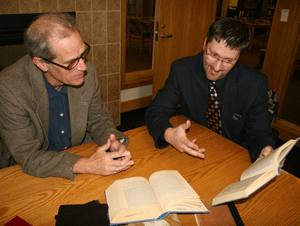The Department of Communication and Media plans a book reception to celebrate the publication of Prophetically Incorrect: A Christian Introduction to Media Criticism, written Paul Patton and Robert Woods, associate professors of communication. The reception will be held on Wednesday, Sept. 29, from 3:00-4:30 p.m. in the Poling Center lobby. 
Released in August, Prophetically Incorrect takes a hard and honest look at the nature of “prophecy” in today’s society – and how mass media can be used as a prophetic voice in today’s cultural wilderness. Written for use in academic settings, the book could develop a wider appeal among Christian consumers considering its intended impact for Christendom as a whole.
The book begins with the premise that all Christians are called to the “Prophethood of Believers,” just as they are also called to the “Priesthood of Believers.” The book strives to distinguish between capital P “prophets” and lowercase p “prophets” – essentially differentiating between those who act as direct messengers of God, and those who strive to be beacons of Truth. Woods and Patton make the case that all Christians should strive to be lowercase prophets – both in the way they produce and consume media.
With that in mind, the book examines the ways various forms of mass media – movies, plays, music, television shows – have the capacity to move in the prophetic, serving as truth-tellers pointing people toward God. The book calls all Christians to consider what type of media they consume and whether it points toward or away from God.
“Most of us can pontificate with some degree of fervency about ‘glorifying God’ when it comes to prayer, reading the Scriptures, or attending worship services, but we get lost once we start trying to make sense of our mass-media engagement as followers of Christ. The book is an attempt to provide some help,” says Patton.
Using Patton’s dissertation on the playwright David Mamet as a jumping-off point for the book, they considered a review of one of Mamet’s plays, and how the reviewer referred to Mamet as the “Prophet of Broadway.” Intrigued by this concept, Patton encouraged Woods to help him research what it meant for someone or something to be labeled a “prophet” in today’s world. What they found was that prophetic voices were all around and in places some wouldn’t expect.
“I enjoyed learning how many individuals outside the mainstream church, like Bono from U2, were acting prophetically,” says Woods. “So many people, from politicians to entertainers, are called prophets.”
The book also studies the Hebrew prophets – those men who serve as models for today’s prophets. Their polarizing personalities and tendency to use “shock-value” for getting Israel and Judah’s attention mirror much of the tactics used by today’s prophets to point out the pitfalls and failures of this generation. Using the motto, WWJD, or What Would Jeremiah Do, Woods and Patton commission all believers to be more intentional about what prophetic voices they are listening to and to be wary of those that deserve the title of “false prophet.”
The book was published by Brazos Press. Copies of the book will be available. The reception will also spotlight other SAU faculty books published in the last year. Light refreshments will be served.


